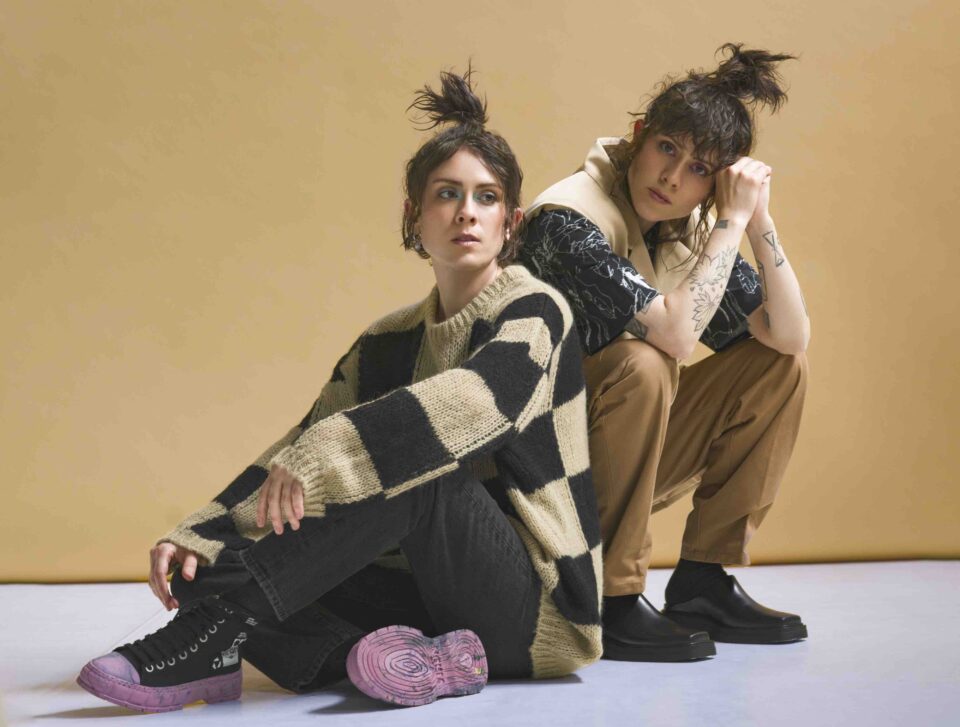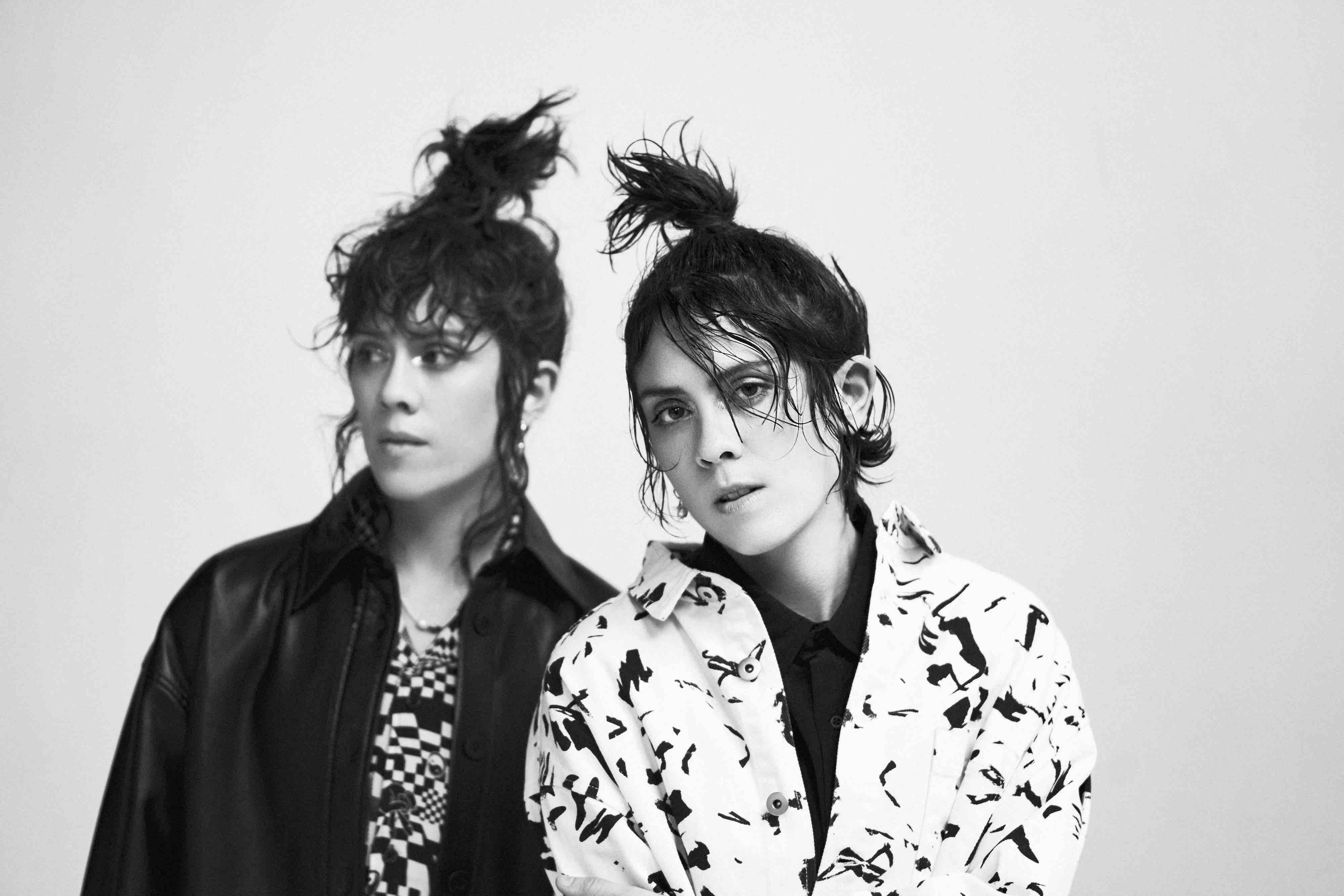Talking to Tegan Quin without her twin sister Sara feels like the conversational equivalent to having a phantom limb. There are moments where I keep anticipating that effortless familial interplay between the two—the friendly interruptions and clarifications, the back-and-forth ribbing, the mutual admiration for one another’s creative strengths—only to snap back and remember I’m speaking to one without the other.
Tegan and Sara are of course still Tegan and Sara: the GRAMMY-nominated, Juno Award–winning, Canadian pop duo who have spent over half their lives making music together and advocating for the political and social rights of the LGBTQ community. But a lot has changed for the sisters over the last few years. Not only did both get married to their respective partners, but Sara became a mom when her partner gave birth to a boy earlier this summer (hence an incredibly warranted change in priorities when it comes to press obligations). Yet somehow the Quin sisters still managed to find the time and energy to write two upcoming graphic novels aimed at middle school readers (the first of which will come out in spring 2023), record their tenth studio album Crybaby, and executive produce High School, a brand-new television series based off their 2019 memoir.
“Three years ago when we put out the book and Hey I’m Just Like You we swore we would never put two things out at once again, because it means double the interviews and double the labor for your team,” says Tegan. “[But] here we are releasing two things. It’s a lot, but honestly we’re workhorses and love being creative and we remain so fucking humbled that people still want us to make shit.”
In our conversation below, Quin discusses the sisters’ latest wave of projects while sharing a bit about what may be on their horizons.
So you once again find yourself promoting two projects at the same time. Which have you been enjoying talking about more?
I really like talking about the show. I could talk about the book [it’s based on] forever, because I love it and I’m really so excited by how many people are talking about it again. We were laughing yesterday because there’s all these billboards up with the book cover, and the poster for the show is like, “Read the book that inspired the series!” And I’m like, “Oh my god, we’re one of those books now.” But the engine of Tegan and Sara is always music, so I love talking about Crybaby.
“With the show I feel like we were very comfortable in that position of letting go because we didn’t have to entirely let go. We were on set almost every day, we were the first ones to read scripts, we gave copious amounts of notes.”
With the memoir, you and Sara were given this opportunity to make something so personal, so direct in its perspective and narrative control. With this TV adaptation you’re handing a great deal of that control over to directors and screenwriters and the actresses who are portraying you. How did you feel about that?
Well in a way, what you just described very much sums up what it’s like to make an album, too. Because even though we co-produce albums, we always have a producer involved in some capacity, and an engineer and a band, and you’re constantly putting your trust in other creatives. So I suppose in a way the TV show felt similarly. Record producer John Congleton and executive producer and co-showrunner Clea DuVall—both brilliant artists. We’re used to being in a space with another brilliant creative, and I think we’ve had really great luck in that we always choose collaborators that want to collaborate with us and appreciate what we bring to the table.

With the show I feel like we were very comfortable in that position of letting go because we didn’t have to entirely let go. It wasn’t like “write the book and then come back a year later and there’s a TV show.” We were on set almost every day, we were the first ones to read scripts, we gave copious amounts of notes, and Laura Kittrell and Clea who wrote the scripts were so patient with us, hearing us out. I think we’re good collaborators. I think we’re really considerate and understanding and we didn’t nose our way into conversations we didn’t belong in, but as executive producers we understood that we could be a part of whatever we wanted, and we started to figure out that balance. I mean, that’s why we chose Clea. She knows us. And he’s a queer woman. I always felt like she had our best interests in mind.
The show has this wonderful indie-film, run-and-gun aesthetic to it and it feels very lived in.
They did a really excellent job. Carolina Costa, who is the DP on the first two episodes—they’re so stunning to me. She just has such an incredible eye. I feel like what’s cool about the show is it can, at times, still feel very modern. It can feel like you’re watching an indie film. It’s not overly pastiche, like, “Ooh, it’s ’90s!” every five seconds.
“‘Just go on your greatest hits tour.’ I don’t want to go on a greatest hits tour. I want to put new music out.”
Over the last several years you’ve spent a tremendous amount of time delving into your past. With so much energy focused on that period of your life, what was your experience working on this new record, making something that felt representative of who you are now?
I think when it came time to write Crybaby, there was more pressure on us not to be so nostalgic and instead try to write more about the current state of our lives and maybe just dream a little bit about what comes next for Tegan and Sara. We left a major label and became independent again, we uncoupled from our managers of 18 years, and I think it just forced us to start to think about what’s missing. What do we want? Why are we still doing this?
I think there’s a self-consciousness—especially with women—in our industry. Because it’s like, “Oh, our 10th record, does anyone need that?” And I think we started to ask ourselves, “Oh, god, have we hit the age where nobody is gonna care that we have a new album?” Clearly that’s not the case, but you ask yourself those questions. It’s something that’s been reflected back to us, that women hit a certain age and nobody cares, that bands have a certain [lifespan] where they put out 10 records and nobody needs [more]. “Just go on your greatest hits tour.” I don’t want to go on a greatest hits tour. I want to put new music out.
So I think we went into writing Crybaby with the intention of asking ourselves, “How do we do something totally new and original? How do we take risks? How do we shake things up? How do we find joy on stage again, and how do we convince an audience that stuck with us for a really long time that they should invest in this new album?” And I think we did that with Crybaby. I think it’s really weird and different. I think it’s really risky. I think we’ve basically dismantled and abandoned everything we’ve been doing for the last 10 years. And I think that’s what artists of our ilk should do. Don’t play it safe, do something different.
I know it may be hard to know about where things go in the future, but however vague, what do you see?
There’s a lot of creative projects that we’re working on outside of music that will fill up the next five years. I obviously hope the TV show continues and we have a big role in that. I’m really excited about these graphic novels we’re putting out because it aims us at a really young audience—like eight-to-15-year-olds. And there are some other TV projects we’re working on, so we’ll be busy for a couple years working in other worlds.
“We’ve basically dismantled and abandoned everything we’ve been doing for the last 10 years. And I think that’s what artists of our ilk should do. Don’t play it safe, do something different.”
Musically, I don’t know. It’ll be interesting to see how people respond to Crybaby and what touring feels like again. I definitely think there’s a shift coming for us in that way, one that has to happen because Sara has a kid now and I don’t know how touring is going to feel for her. She’s gonna bring her partner and the baby, and our mom is gonna come. But inevitably there will be some conversation about how to make that sustainable.
I think for Sara and I, we’ve been on the treadmill for 22 years. And while I don’t know that we know how to get off of it, I think with some of these other projects it’s like we’re maybe moving to the elliptical or some free weights. We’re experimenting with other things because we’re kind of exhausted by the treadmill—which doesn’t mean we don’t want to do music. It’s just tough. I think it’s just getting older, too. When I was 30 and journalists would ask whether I was going to have kids and go off the road I found that so offensive. But now we’re 40, and while I’m not going to have kids, I definitely don’t want to do 200 days a year on the road. FL







